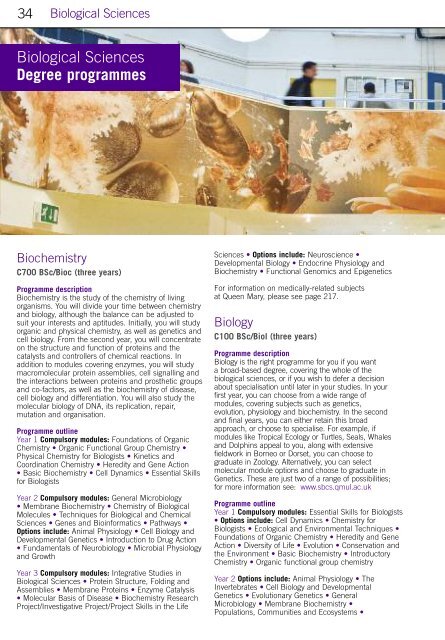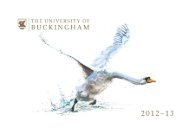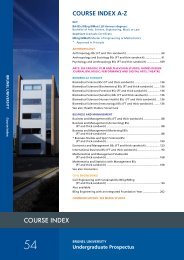student profile
student profile
student profile
Create successful ePaper yourself
Turn your PDF publications into a flip-book with our unique Google optimized e-Paper software.
34<br />
Biological Sciences<br />
Biological Sciences<br />
Degree programmes<br />
Biochemistry<br />
C700 BSc/Bioc (three years)<br />
Programme description<br />
Biochemistry is the study of the chemistry of living<br />
organisms. You will divide your time between chemistry<br />
and biology, although the balance can be adjusted to<br />
suit your interests and aptitudes. Initially, you will study<br />
organic and physical chemistry, as well as genetics and<br />
cell biology. From the second year, you will concentrate<br />
on the structure and function of proteins and the<br />
catalysts and controllers of chemical reactions. In<br />
addition to modules covering enzymes, you will study<br />
macromolecular protein assemblies, cell signalling and<br />
the interactions between proteins and prosthetic groups<br />
and co-factors, as well as the biochemistry of disease,<br />
cell biology and differentiation. You will also study the<br />
molecular biology of DNA, its replication, repair,<br />
mutation and organisation.<br />
Programme outline<br />
Year 1 Compulsory modules: Foundations of Organic<br />
Chemistry • Organic Functional Group Chemistry •<br />
Physical Chemistry for Biologists • Kinetics and<br />
Coordination Chemistry • Heredity and Gene Action<br />
• Basic Biochemistry • Cell Dynamics • Essential Skills<br />
for Biologists<br />
Year 2 Compulsory modules: General Microbiology<br />
• Membrane Biochemistry • Chemistry of Biological<br />
Molecules • Techniques for Biological and Chemical<br />
Sciences • Genes and Bioinformatics • Pathways •<br />
Options include: Animal Physiology • Cell Biology and<br />
Developmental Genetics • Introduction to Drug Action<br />
• Fundamentals of Neurobiology • Microbial Physiology<br />
and Growth<br />
Year 3 Compulsory modules: Integrative Studies in<br />
Biological Sciences • Protein Structure, Folding and<br />
Assemblies • Membrane Proteins • Enzyme Catalysis<br />
• Molecular Basis of Disease • Biochemistry Research<br />
Project/Investigative Project/Project Skills in the Life<br />
Sciences • Options include: Neuroscience •<br />
Developmental Biology • Endocrine Physiology and<br />
Biochemistry • Functional Genomics and Epigenetics<br />
For information on medically-related subjects<br />
at Queen Mary, please see page 217.<br />
Biology<br />
C100 BSc/Biol (three years)<br />
Programme description<br />
Biology is the right programme for you if you want<br />
a broad-based degree, covering the whole of the<br />
biological sciences, or if you wish to defer a decision<br />
about specialisation until later in your studies. In your<br />
first year, you can choose from a wide range of<br />
modules, covering subjects such as genetics,<br />
evolution, physiology and biochemistry. In the second<br />
and final years, you can either retain this broad<br />
approach, or choose to specialise. For example, if<br />
modules like Tropical Ecology or Turtles, Seals, Whales<br />
and Dolphins appeal to you, along with extensive<br />
fieldwork in Borneo or Dorset, you can choose to<br />
graduate in Zoology. Alternatively, you can select<br />
molecular module options and choose to graduate in<br />
Genetics. These are just two of a range of possibilities;<br />
for more information see: www.sbcs.qmul.ac.uk<br />
Programme outline<br />
Year 1 Compulsory modules: Essential Skills for Biologists<br />
• Options include: Cell Dynamics • Chemistry for<br />
Biologists • Ecological and Environmental Techniques •<br />
Foundations of Organic Chemistry • Heredity and Gene<br />
Action • Diversity of Life • Evolution • Conservation and<br />
the Environment • Basic Biochemistry • Introductory<br />
Chemistry • Organic functional group chemistry<br />
Year 2 Options include: Animal Physiology • The<br />
Invertebrates • Cell Biology and Developmental<br />
Genetics • Evolutionary Genetics • General<br />
Microbiology • Membrane Biochemistry •<br />
Populations, Communities and Ecosystems •
















